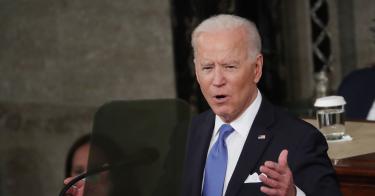The Biden administration’s American Jobs Plan would spend $2.65 trillion on infrastructure and other things over the next 10 years. To help pay for that, it proposes hiking the corporate income tax rate from 21% to 28%.
A higher corporate tax rate has political appeal because politicians sell it as falling on shareholders and not on workers. It’s a savvy pitch because most voters see themselves as workers and not shareholders.
But ultimately, taxes can’t fall on corporations because they are only legal vehicles for income. Any revenue that comes in and isn’t used to cover expenses (including taxes) is paid out to workers and shareholders, so they end up bearing the cost of taxes.
The typical shareholder is not Jeff Bezos, however. It’s the man or woman next door—and probably you, too. According to the Survey of Consumer Finances, about 75% of families have either a retirement account or pension plan. The corporate tax increase will affect everyone who owns shares of public corporations, either directly or indirectly through mutual or pension funds.
Pension funds depend on the returns from their portfolios to pay benefits. For example, the New York State Teachers Retirement System ;holds about $2 billion of Amazon stock, among many others. If Amazon gets hit with higher taxes, that hit Amazon would mean less money for the teachers’ retirement fund.
When taxes on labor go up, most people notice—either through the bigger deduction in their pay stubs or the bigger check they have to write the IRS at tax time each year. But changes in capital income are less noticeable, particularly when households hold shares for the long term. Savers will only realize the cost of corporate taxes years later in lower account values when they cash out their retirement accounts.
Workers pay a share of corporate taxes too, even if they aren’t included as a line item on pay stubs like payroll taxes. When the non-partisan Congressional Budget Office calculates the distribution of federal taxes paid by each household, it allocates 25% of the corporate tax burden to households in proportion to their labor income. While the exact share borne by workers is still a matter for research, there is a consensus that the cost doesn’t fall entirely on shareholders.
Firms pass a portion of the corporate tax on to workers through their responses in different markets. Firms decide whether to take on new business by looking at the cost of capital, which increases as the corporate tax rate increases. When capital is more expensive, they invest less and generate less income because fewer projects cover their costs. With less capital, workers are less productive, and wages fall.
Because firms change their investment and hiring decisions to stay in business, the higher corporate tax lowers income by more than it raises revenue. After all, the government can’t tax economic activity that doesn’t occur. In my estimation, raising the corporate rate from 21% to 28% would bring in new revenues on the order of $80 billion per year while lowering national income by about $200 billion per year.
The administration is promoting the tax increase as a coordinated action with other countries to minimize tax avoidance by firms. The coordination is required to reduce competition for business between countries by lowering tax rates. If all countries raise corporate tax rates together, firms won’t be able to shift business to somewhere that offers more favorable rates. But making it more expensive to do business everywhere still leaves firms with the option of not doing business at all.
>>> America Is Competitive Again, Thanks to a Lower Corporate Tax Rate
The administration wants to compete on the strength of our economy, but that doesn’t mean that we need more federal spending. We can produce the skilled workers, new research, and updated infrastructure to compete with other countries without direct government funding. We can make energy-efficient housing and electric vehicles without imposing costly taxes that make it harder to do business.
The costs of higher corporate taxes will end up being passed on to typical Americans through lower wages and smaller retirement accounts. Instead, we should keep taxes low and spending in line with revenue to help the economy produce the best goods at the lowest cost.
This piece originally appeared in The Washington Times



